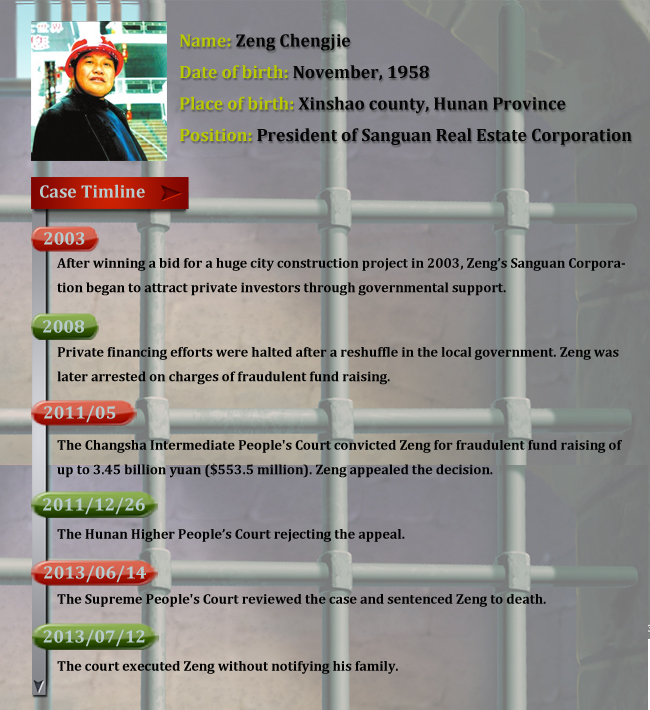HOME >>
Court blasted for failure to notify family in swift execution
Source:Globaltimes.cn Published: 2013-7-15 17:30:00
| Latest News |
Uproar over hasty execution
The family of an executed millionaire on July 14 vowed to appeal the fraud case against him, after the local court in Changsha, Central China's Hunan Province ordered the convict to be executed without notifying his family.
| Case Details |

| Weibo records |
|
| Time |
Weibo message |
| July 12 10:04 pm |
“My father was executed this morning. Because the government waited until now to notify us, we did not have the chance to visit him for the last time and could not listen to his last words. “ |
| July 13 9:26 pm |
“I apologize for misunderstanding the Changsha Intermediate People's Court. I only want to collect my father’s ashes.” |
| July 14 2:47 pm |
“I take back my apology to the Changsha Intermediate People's Court. They should be punished for their behavior. I will continue to prove my father’s innocence through the law. “ |
| July 13 5:19 pm |
“There is no clear procedure in the law that allows the families of prisoners awaiting execution to be allowed to meet one last time.” |
| July 13 6:56 pm |
The original post was deleted and replaced by a statement claiming that the judge had formal notified Zeng of his right to meet his family before the execution but that Zeng "didn't ask to do so." |
| July 13 8:00 pm |
“We apologize for the deleted message. The employee who posted that message does not fully understand the Criminal Law. His leader has criticized him. We welcome more supervision.” |
| Viewpoints |
Criminal Laws:
According to the judicial interpretation from the Supreme People's Court (SPC), criminals are entitled to meet with their family before execution, should either party ask to do so.
Experts say:
Tong Zongjin, a law professor with the China University of Political Science and Law:
it was illegal for the court to notify Zeng of his right so shortly before the execution as the procedure did not provide time for a meeting.
Zhao Bingzhi, a law professor with the Beijing Normal University:
Executions have been reduced since the SPC took back the authority of approval in 2007 and improved judicial standards, but the procedure still needs stricter conviction standards.
Lin Wei, a law professor with the China Youth University for Political Sciences:
The death penalty should be limited and eventually ended for purely economic crimes that had not involved violence or sustained intention to illegally use the funds.
Media comments:
Nandu Daily: Humanity illuminates dark corners of justice
Even if the death sentence fits the crime, judicial authorities are still required to protect the prisoner’s right to see his relatives. This time, however, the accused was denied of this basic right.
The way criminals are treated and how the law guarantees their basic human rights are an indicator of the civility and sophistication of a nation. Prior inhumane regulations need to be carefully reexamined. We urgently need humanity to shine its light on the dark corners of justice.
The Beijing News: Condemned have right to be consoled
To allow those condemned to death to see their relatives is both humane and clearly stipulated by the law. Even though Zeng’s sentence is just, the court has ultimately mishandled justice not notifying his relatives and then giving contradictory explanations.
Beijing Times: Courts lack the Weibo touch
Within several hours the Changsha Intermediate People's Court found itself in the middle of a relations crisis. The court’s three posts on Weibo not only failed to answer questions but attracted even more dissatisfaction.
Although the court responded quickly, it did little to appease public concern, which shows legal authorities are not well-equipped to handle such situations through Weibo.
| Similar Cases |
| Name | Crime | Penalty | Report |
| Wu Ying | cheating investors out of 380 million yuan ($60 million) | a death penalty with a two-year reprieve | Wu Ying gets death penalty with reprieve |
| Du Yimin | illegally raising more than 700 million yuan ($103 million) | death penalty | Fraudster executed in East China |
| News Vocab |
集资诈骗 jízī zhàpiàn fundraising fraud
Example:
社会广泛关注的曾成杰集资诈骗案有了最终的结果,案件主犯曾成杰被长沙市中级人民法院依法执行死刑。(Source: 《法制周报》)
The case of Zheng Chengjie, who stood accused of fraudulent fundraising, came to an end after Zeng was executed by the Changsha Intermediate People's Court in accordance with the law.
Posted in: Frontpage